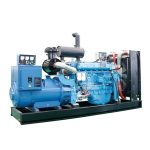Introduction
In today's digital age, data acquisition plays a crucial role in various industries, from manufacturing to healthcare to telecommunications. The ability to collect, process, and analyze data in real-time is essential for making informed decisions and optimizing operations. One of the key components of a reliable data acquisition system is a power source that can ensure continuous operation, especially in remote or off-grid locations where access to the electrical grid may be limited or unreliable. In such cases, diesel generators are often used to provide a stable and uninterrupted power supply for data acquisition systems. This article will explore the role of diesel generators in data acquisition, their benefits and challenges, and best practices for their deployment.
The Role of Diesel Generators in Data Acquisition

Data acquisition systems are used to collect data from sensors, instruments, and other sources in real-time. These systems typically consist of various components, including sensors, data loggers, transmitters, and communication devices. To ensure the continuous operation of these components, a reliable power source is essential. Diesel generators are often chosen for data acquisition applications due to their ability to provide a stable power supply for extended periods, even in remote or harsh environments.
Diesel generators work by converting diesel fuel into mechanical energy, which is then converted into electrical energy through an alternator. This electrical energy is then used to power the various components of a data acquisition system. Diesel generators are known for their reliability, durability, and ability to provide a consistent power output, making them well-suited for applications where uninterrupted power is critical.
Benefits of Using Diesel Generators for Data Acquisition
There are several benefits to using diesel generators for data acquisition applications:
1. Reliability: Diesel generators are known for their reliability and durability. They can provide a stable power supply for extended periods without the need for frequent maintenance or refueling, making them ideal for applications where uninterrupted power is essential.
2. Fuel Efficiency: Diesel generators are more fuel-efficient than gasoline generators, meaning they can provide a higher power output for a given amount of fuel. This can lead to cost savings in the long run, especially for applications that require continuous operation.
3. Power Output: Diesel generators are capable of providing a high power output, making them suitable for applications that require a significant amount of electrical energy, such as data acquisition systems with multiple sensors and devices.
4. Longevity: Diesel generators are designed to operate for extended periods without experiencing significant wear and tear. With proper maintenance, a diesel generator can last for many years, providing a reliable power source for data acquisition systems.
https://www.lkpowerplant.com/50kw/ of Using Diesel Generators for Data Acquisition
While diesel generators offer several benefits for data acquisition applications, there are also some challenges to consider:
1. Environmental Impact: Diesel generators emit pollutants such as nitrogen oxides and particulate matter, which can have negative environmental impacts. In sensitive or regulated environments, the use of diesel generators may be restricted or require additional emissions control measures.
2. Noise and Vibration: Diesel generators can be noisy and produce vibrations during operation, which can be a concern in environments where noise levels need to be minimized, such as research facilities or residential areas.
3. Maintenance Requirements: Diesel generators require regular maintenance to ensure optimal performance and longevity. This can include tasks such as oil changes, filter replacements, and inspections of critical components. Failure to properly maintain a diesel generator can result in downtime and costly repairs.
4. Fuel Storage and Handling: Diesel fuel must be stored and handled safely to prevent spills, leaks, and contamination. Proper fuel management practices are essential to ensure the reliable operation of a diesel generator and prevent environmental damage.
Best Practices for Deploying Diesel Generators for Data Acquisition
To maximize the benefits of using diesel generators for data acquisition applications and mitigate potential challenges, the following best practices should be followed:
1. Proper Sizing: It is essential to properly size a diesel generator based on the power requirements of the data acquisition system. An undersized generator may not be able to meet the power demands, while an oversized generator can lead to inefficiencies and increased fuel consumption.
2. Regular Maintenance: A preventive maintenance schedule should be established for the diesel generator to ensure optimal performance and reliability. This includes tasks such as oil changes, filter replacements, and inspections of critical components. Maintenance should be performed by qualified technicians according to the manufacturer's recommendations.
3. Fuel Management: Proper fuel storage and handling practices should be followed to ensure the quality and integrity of the diesel fuel. This includes storing fuel in designated containers, monitoring fuel levels, and conducting regular inspections for signs of contamination or degradation.
4. Emissions Control: In environmentally sensitive areas, emissions control measures may be required to reduce the environmental impact of diesel generators. This can include the use of emissions control devices such as catalytic converters or diesel particulate filters.
5. Noise Mitigation: To reduce the noise and vibration produced by a diesel generator, soundproofing measures can be implemented, such as installing acoustic enclosures or barriers around the generator. Additionally, scheduling generator maintenance and testing during off-peak hours can help minimize disruptions.
Conclusion
Diesel generators play a crucial role in providing a reliable power source for data acquisition systems in various industries. While they offer several benefits, such as reliability, fuel efficiency, and high power output, there are also challenges to consider, including environmental impact, noise, and maintenance requirements. By following best practices for deploying diesel generators, such as proper sizing, regular maintenance, fuel management, emissions control, and noise mitigation, organizations can ensure the optimal performance and longevity of their data acquisition systems. With the right approach, diesel generators can be a cost-effective and efficient solution for powering data acquisition applications in remote or off-grid locations.
